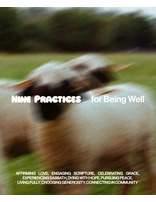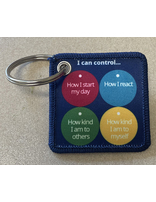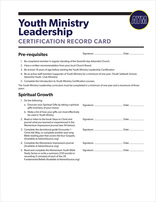 Answer: Bravo to you! You want to be accepting and love people without being judgmental like close-minded Christians. And what a “balancing act” it is to love the sinner and yet hate the sin.
Answer: Bravo to you! You want to be accepting and love people without being judgmental like close-minded Christians. And what a “balancing act” it is to love the sinner and yet hate the sin.The first text that comes to my mind when I read your question is one I’ve often heard others quote—1 Peter 3:15-16 (TEV), “Be ready at all times to answer anyone who asks you to explain the hope you have in you, but do it with gentleness and respect.”
“Gentleness” and “respect” often get associated with “loving,” although I think they have more to do with kindness than love. Being “ready to give an answer” indicates that you have given some advance thought given to what you believe and why you believe it.
When you know these things, it’s much easier to give an answer that is factual and personal, such as, “I would rather not come to your party since it sounds like it’s just a gathering to get drunk and I’ve chosen to be filled with the Holy Spirit rather than with booze (see Ephesians 5:18).”
But if you’re not sure that drinking a little is really wrong or that being included with friends is more important than taking a stand, you might wiggle out of taking a stand and say something like, “Thanks man, I’ll see if I can be there,” and then not show up and say something came up.
You can try other topics besides drinking. One that often pushes people to extremes is homosexuality. Christians opposed to homosexuality point to text that seem to say it’s a bad thing (typical texts cited include Romans 1:27-28 and Jude 7). Our family went to a Christian youth leaders convention. Outside was a group of back-woods-looking people with big signs denouncing homosexuality. Because they were making a strong, public stand, many of the Christians at the convention (including my daughter), took them on in a debate. I saw some people engaged in the discussion because of the topic, while others took a stand based more on how people were going about the topic (not just “what you say” but also “how you say it”).
Another hot topic in America has been America’s involvement in Iraq. Christians don’t necessarily agree on this one—some believing that evil must be held in check or destroyed (like when the Israelites wiped out groups of people when entering Canaan—remember the conquest of Jericho [see Joshua 6]). Other Christians quote Romans 12:21, “Overcome evil with good.” Another branch of this debate is how to relate to Muslims when you’re a Christian. The Crusades pitted these two religious groups against each other. Some think it will be repeated. How do you make a decision (a “judgment”) on these topics without being “judgmental” of others?
Occasionally a street-corner preacher on a soap box wins a convert, but usually it’s just bad press to witness in this manner. Popular youth speaker Rob Bell made a DVD presentation called “Bullhorn.” In it, a guy with a bullhorn tries to shout his message to people in order to convert them. In the words of Pastor Bell, “Hey bullhorn guy, it’s not working.”
How can you love the sinner and hate the sin? Only by having the love of God. The most familiar verse in the entire Bible demonstrates this, “For God so loved the world that He gave His only begotten Son, that whoever believes in Him should not perish, but have everlasting life.” John 3:16 (NKJV)
A characteristic of Jesus was that he went after people to help them, not to hurt or condemn them. The next verse of John 3 makes that plain. For God did not send his Son into the world to be its judge, but to be its savior. John 3:17 (TEV).
I wish that I could say that was all there is to it. But the next few verses of John 3 point out a reality that you won’t be able to escape, and it very much relates to your question. Let’s continue, “Whoever believes in the Son is not judged; but whoever does not believe has already been judged, because he has not believed in God’s only Son. This is how the judgment works; the light has come into the world, but people love the darkness rather than the light, because their deeds are evil. Anyone who does evil things hates the light, because he does not want his evil deeds to be shown up. But whoever does what is true comes to the light in order that the light may show that what he did was in obedience to God.” John 3:18-21 (TEV).
Here’s my paraphrase: Good and God go together. Bad seeks to avoid good and God. You can’t have it both ways.
Good and gentle Jesus hated the sin and loved the sinners. Those who were known as bad people flocked to him. Those who were considered good on the outside are the ones who did him in.
How is it with you? Do those known as “bad people” want to be around you (because of your goodness, not because you’re a chameleon)? If that’s the case, don’t be surprised if those considered good on the outside will pass negative judgment on you. (see Luke 7:38-39; Matthew 9:9-13).
It is possible to love and accept people without loving or accepting what they do. Family members do it all the time. So do friends. Just because you don’t want to smoke with somebody doesn’t mean you reject everything about them. Just because one of your friends has a problem with gossip doesn’t mean that you drop them immediately. And just because you have a tendency to lie to cover yourself doesn’t mean that you get kicked out of your family or your friends will never accept you again. Hopefully your family and friends will work with you on your faults while they love and accept you for being a child of God.
In the same way, love and accept others because they are children of God, not because of their behaviors. Try this approach: “Do not bring sorrow to God’s Holy Spirit by the way you live. Remember, he is the one who has identified you as his own, guaranteeing that you will be saved on the day of redemption. Get rid of all bitterness, rage, anger, harsh words, and slander, as well as all types of malicious behavior. Instead, be kind to each other, tenderhearted, forgiving one another, just as God through Christ has forgiven you.” Ephesians 4:30-32 (NLT)
And I can’t guarantee that everything will be “nice” for you when you do this. Our first text, when taken in context, gives a much broader message. I think it summarizes my response to you. It goes like this: “Who will harm you if you are eager to do what is good? But even if you should suffer for doing what is right, how happy you are! Do not be afraid of anyone, and do not worry. But have reverence for Christ in your hearts, and honor him as Lord. Be ready at all times to answer anyone who asks you to explain the hope you have in you, but do it with gentleness and respect. Keep your conscience clear, so that when you are insulted, those who speak evil of your good conduct as followers of Christ will become ashamed of what they say. For it is better to suffer for doing good, if this should be God’s will, than for doing evil.” 1 Peter 3:13-17 (TEV)

















